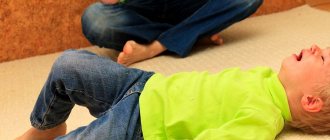Set a sleep mode
The baby should obey only your rules. It is wrong to give the child the opportunity to fall asleep and wake up when he wants. Find a time slot that works best for you and stick to it. For example, put your child to bed at nine in the evening and wake him up at five in the morning. Or let him go to bed at eleven at night on the condition that he wakes up at seven in the morning, etc.
Dream
Let's start with a well-known fact: a person sleeps a third of his life. This is an ordinary person, an adult. Children sleep more. Newborns generally do nothing but sleep, taking only short breaks for snacks (“when they don’t sleep, they eat, when they eat, they don’t sleep”). It is not surprising that sleep, as a global phenomenon, plays an important role in human existence. And, like any global phenomenon, the sleep process is surrounded by many different problems. It would be unfair to leave these problems without consideration, especially given the fact that we have already discussed issues related to nutrition, walking and relaxation. Let's start with an attempt to fundamentally understand the phenomenon itself. What is sleep, why is it needed in general? For many years, scientists have adhered to a fairly clear, logical and convincing theory, according to which wakefulness is accompanied by the accumulation in the human body of certain substances (sleep factors) that cause “brain fatigue.” To neutralize these very substances, sleep is needed, during which the “sleep factors” are destroyed, the rested brain gets the opportunity to stay awake, and the owner of the brain is able to lead an active lifestyle. The above theory captivates with its absolute clarity even for non-specialists. It’s more difficult with specialists - in an effort to prove absolutely understandable things, they have been trying and trying to discover “sleep factors” for decades, but nothing works. The more people study sleep, the less they understand the meaning of this phenomenon - there are no convincing answers to the question: why should a person spend 1/3 of his life on an unproductive stay in bed? But no matter how complex the modern theories of sleep, the elementary life experience of humanity as a whole and an individual in particular shows: sleep is vital. Well, this is how nature has established it - the normal functioning of animals (a person is considered here as a special case of a particularly intelligent animal) is impossible without a special form of brain function, which is called sleep. The attitude of parents towards children's sleep changes quite significantly as the child grows, as do the problems surrounding sleep. It is quite advisable to divide the discussion of these problems into three interrelated parts - 1. Infant sleep (newborn and the first months of life); 2. Sleep of healthy children; 3. The relationship between sleep and illness. Let's look at them in order.
INFANT SLEEP (newborn and first months of life)
The newborn sleeps most of the day. Since in addition to sleeping he also eats, the close relationship between these processes is obvious. The presence or absence of a “sleep mode” depends on the presence or absence of a “eating mode”. The obvious conclusion is that the feeding system fundamentally determines the answer to the question: “when and how much to sleep?” Currently, most pediatricians have stopped recommending “strict adherence to the diet” to mothers, which meant feeding at intervals of 3 hours with a mandatory night break of 6 hours. The free feeding system is finding more and more fans (both among pediatricians and parents). The essence of this system is that the child is fed when he wants to eat. A mandatory night break, when a hungry child screams for hours and thus learns “discipline,” is no longer recommended, quite rightly considering it (the night break) to be a deliberate mockery of all family members. Babies' sleep is one of the most important indicators of their health. The child sleeps until the feeling of hunger is triggered. If you are full but not sleeping, it means something is wrong. It’s either wrong with health or with the place where the child has to sleep (hot, cold, wet, etc.). As the child grows, episodes of wakefulness appear and lengthen, but they should not (normally, of course) manifest themselves in screams and screams - if this is the case, the reasons are the same - problems either with health or with the environment. One of the most fundamental issues is the children's room. Regardless of whether this room is exclusively for children or at the same time a children’s room plus a parents’ bedroom, there are a number of certain requirements, compliance with which is the key to a restful sleep to the delight of mom and dad. Necessary clarification: when using the phrase “children’s room,” the author means the place where the child sleeps. It would be more logical, of course, to talk about a “children’s bedroom,” but it is difficult for our average compatriot to imagine such a strange life when a child has not only his own bedroom, but also his own children’s room where he can play and study. This clarification is provided for particularly lucky comrades who have successfully solved the problems of living space. The main thing in relation to a children's room is the answer to the question “how to breathe?” There is nothing more harmful for a child, especially the first months of life, than dry and warm air: - optimal temperature - 18-20 ° C; - 16 °C is better than 22 °C; — an extra vest is better than the latest heater; - no dust accumulators are desirable in the children's room - carpets, upholstered furniture, soft toys; any items that cannot be cleaned by wet cleaning. The crib is preferably wooden. No pillows!!! The mattress is smooth and hard. In principle, a child's room is mainly intended for sleeping at night. During the day, it is advisable for the child to sleep in the fresh air, and there is no limit here (that is, there will not be much). It is obvious that for babies, unlike children of other age groups, sleeping in the fresh air is tantamount to walking. Therefore, we will not repeat ourselves, and we refer readers who want to find out how to go for a walk (where, with whom, when and how much) to the article “Let's go for a walk.” In the complex of problems surrounding infants' sleep, two stand out: 1. Does not sleep until rocked to sleep; 2. Doesn't sleep in bed, but sleeps well in mom's arms. Regarding motion sickness, we note that children have a rather weak vestibular apparatus (balance organ). When rocking, a feeling of dizziness quickly arises, and in some cases the child simply loses consciousness. In popular parlance this is called “sickness”. It is quite difficult to wean a baby who is used to rocking. It is clear that it is better not to start, since motion sickness is not very useful for the child and is not very pleasant for his relatives. A special issue is sleeping in your arms. From the point of view of Nature, a newborn human baby is inseparable from its mother. A wild human female cannot leave her baby alone and go away. The described relationship is realized in the form of a specific instinct - not feeling anything large and warm nearby, the child experiences instinctive fear and screams invitingly. They picked him up - the instinct was realized - the baby fell silent. The severity of the described instinct varies among children, hence the different severity of the problem of sleeping in the arms of adults. But the main thing is different - not finding realization, the instinct fades away. Therefore, sitting for days with a child in their arms - as long as the house is quiet - parents only support the instinct, closing a vicious circle. You have to be patient - sometimes one or two days is enough, sometimes a week, depending on your luck. It is only important to be sure that it is instinctive fears that are the root cause of children's screams. By the way, it is not at all difficult to verify this - not a single sore will go away just because the child was picked up. So if the child squeaks both in your arms and in the bed, look for illness or unsatisfied desires (i.e. wants, but cannot, to eat, drink, pee, poop, etc.), but if he is silent in your arms, but screaming in bed - be patient. And in conclusion, we emphasize: a healthy child who develops normally knows how much sleep he needs. It is wrong to wake up a baby just because, in the parents' opinion, it is time for him to do something else - eat, for example. For normal development and normal health, sleep is no less important than food.
SLEEP OF HEALTHY CHILDREN
Not a single guide to raising children is complete without a specific table that indicates how much a child should sleep at the appropriate age - how many times and for how many hours. Being very skeptical about attempts at strict mathematical regulation of lifestyle, the author, nevertheless, considers it his duty to provide some average values of the recommended parameters. From 1 year to 1.5 years: number of periods of daytime sleep - 2 (1st - 2 - 2.5 hours, 2nd - 1.5 hours); night sleep - 10-11 hours; From 1.5 to 2 years: the number of periods of daytime sleep is 1, its duration is 2.5 - 3 hours; night sleep - 10-11 hours; 2 - 3 years: 1 daytime nap lasting 2 - 2.5 hours; night sleep - 10-11 hours; In the future - up to 7 years - it is recommended to have 1 daytime sleep (about 2 hours) and 10 hours of night sleep. After 7 years, they are allowed not to sleep during the day, and at night - at least 8 - 9 hours. Having paid our debt to the “norms”, we will consider specific problems. Everything that was written above about the children's room has no age specificity - at any age the optimal temperature is about 18-20 ° C, at any age dust accumulations are not desirable. From a doctor's point of view, the main requirement for sleep seems quite simple - sleep should create conditions for adequate wakefulness after waking up. The practical implementation of this very simple proposition is surrounded by problems that are more related to other sciences (pedagogy, sociology) - naturally, when a person sleeps not because it is time to sleep, but because he wants to sleep. It’s natural to wake up not because you have to, but because you’ve had enough sleep. But the rules of human society cannot (namely cannot, not do not want) take into account these biological “tricks”. The human body, and a child of any age is no exception, lives according to special rhythms (daily, seasonal, annual), which determine the need and ratio of periods of sleep and wakefulness. The desire to sleep, the time required for proper rest, and the depth of sleep are influenced by many factors - the aforementioned biorhythms, meteorological conditions, health, and lifestyle. Everyone knows that the desire to sleep is largely related to the intensity of physical activity, while at the same time, excessive emotional stress interferes with sleep. The main parental problem is “I don’t want to sleep.” The approach to solving it is largely determined by the morning awakening and allows us to formulate a simple rule: if getting up in the morning occurs naturally and without negative emotions, going to bed does not matter at all. I note that the parental slogan “time to sleep” can be dictated by the interests of the parents themselves - dad wants to sleep, or, as an option, dad wants mom, and there is only one room. This problem cannot be solved through the advice of a pediatrician. A special and very common situation can be characterized by the phrase “if you don’t put it down, you can’t pick it up.” The factors influencing it are largely controllable. But a number of moments are not subject to any pedagogical influences, since they are determined by individual biorhythms (the famous and unquestionable division of human individuals into “larks” and “owls”). There are three rational ways to deal with children’s “I don’t want to sleep.” Method one. Increased physical activity - sports, maximum exposure to fresh air, housework. Method two. Limiting emotional stress, especially in the evenings - at least, it is not advisable to give a long-awaited toy at 20.00, and checking the diary at 21.00 should be considered a pedagogical crime. Method three. Do not create a problem where there is none in principle. Taking into account children's desire to copy adults. The topic of “time to sleep” should not be raised at all. Either the child will want to sleep on his own, or will go to bed, imitating dad and mom. The more attention a family pays to bedtime, the more often parents look at the clock, the louder and stricter the “go to bed” order sounds, the more problems arise. Now let's look at some sleep disorders that occur in absolutely healthy children. They often wake up feeling thirsty. The main reason (99%) is a violation of the main rule of children's sleep - a clean, cool children's room. The mucous membranes dry out, the reasons are clear (warm, dry, heaters, carpets, dust). If the physical parameters of the children's room are not changed in time, “night drinking” becomes fixed as a reflex. Grinding of teeth in sleep. There are no differences among the popular masses in answering the question about the cause of this phenomenon. Absolutely everyone knows well: “if a child grinds his teeth, it means he has worms.” This position, however, is not confirmed. Worms, of course, occur in people who grind their teeth, but not more often than in others who do not grind their teeth. Neither doctors nor physiological scientists who have been studying sleep for many years know why this happens, but they are sure of one thing - it is not a disease, it goes away over time, although there are two negative points - it is not very pleasant from an aesthetic point of view vision and the very real possibility of dental damage. There is a theory according to which the reason for grinding teeth in sleep is a rudimentary (i.e., underdeveloped, residual) reflex, similar to the reflexes of animals that sharpen their teeth in this way. Bedwetting, or enuresis. This very unpleasant phenomenon occurs in 10% of children. There are dozens of ways to pharmacologically and psychotherapeutically correct this phenomenon. None of these methods is absolutely effective, although some methods in individual children lead to excellent results. Doctors still do not know the causes of enuresis. It is believed that a special focus sometimes forms in the maturing brain, which in a certain phase of sleep triggers the reflex to empty the bladder. Since we are talking specifically about the maturing brain, enuresis stops sooner or later. Night terrors. Most often occur between the ages of 3 and 8 years and during puberty. They do not pose a particular danger, but their frequency and severity largely depend on the psychological atmosphere in the family and on the basic common sense of the parents. Scary bedtime stories, television horror films, stories about Grandfather Babai and about a naughty boy who was dragged away by the evil dog Barbos. An individual children's room increases the likelihood of night terrors - sleeping more peacefully with your parents. At the same time, fears at the stage of going to bed (fear of darkness, silence, the sound of the wind outside the window) require a respectful attitude. Do not make fun of him under any circumstances, maybe sit next to him until he falls asleep. The most important rule regulating the attitude of parents towards any children's nighttime problems is the maximum possible goodwill. Whatever the child did in his sleep—grinded his teeth, wet the bed, walked, talked, snored and sniffled—he didn’t do it. It was not him; the thinking part of the children's brains had nothing to do with all the processes described above. Let me remind you once again: the very best specialists still cannot understand what sleep is and why you need to sleep. Everything that happens in a dream largely remains a sealed secret, and scolding a child for a wet bed is, to say the least, unreasonable.
SLEEP AND DISEASES
The sleep of a child of any age is one of the most important criteria for health. Any significant deviations from sleep patterns - sudden awakening at an unusual time and especially (!) the desire to sleep at an unusual time - are a very alarming sign and require special vigilance on the part of parents - measure body temperature, ask questions (whether it hurts or not), wake up again at night - look, touch the forehead. It should be remembered that drowsiness is a typical manifestation of high body temperature and critical fluid deficiency in the body. If medical prescriptions cannot be carried out due to drowsiness (does not drink liquids, does not want to swallow medications), this is a clear indication for immediate hospitalization. During any illness, but especially during acute respiratory diseases, priority attention should be paid to the children's room. Factors that we consider desirable for a healthy child become mandatory when diseases develop. Any respiratory viral infection is accompanied by increased formation of mucus throughout the respiratory tract - from the nasal mucosa to the bronchi. Drying of this mucus is a major risk factor, greatly increasing the risk of bacterial complications. Accumulation and drying of mucus during sleep is more likely (more stuffy, the child does not move or drink). Hence the mandatory condition for a sick child to sleep: warm clothes, but clean, cool and moist air. Repeated wet cleaning throughout the day. Some, although quite obvious, points relate to the nighttime actions of parents during childhood illnesses. Do not close the door to the children's room, be nearby, give him something to drink, change clothes, calm him down, take his temperature again. In general, the sleep pattern of a sick child can change in the most significant way - the usual hours of sleep are shifted, their duration changes (as a rule, lengthens). This is quite natural, but something else is more important - restoring normal sleep patterns is the most important sign of recovery.
author Komarovsky E.O. published 18/01/2007 14:51 updated 14/06/2019 — Lifestyle
Decide on a location
Dr. Komarovsky believes that until the age of three, it is acceptable to leave the crib in the parent's bedroom, but it is best if the baby sleeps in the same room as mom and dad until he is one year old. Then it is better to move the crib to the nursery.
What is known about the film “Twice Two”, completely shot on a Galaxy smartphone
Curd and poppy seed pie is quickly prepared and eaten instantly: recipe
Green Christmas trees: scientists have put forward a hypothesis about the metabolism of coniferous trees
The child sweats at night.
By and large, sweating is a reaction to heat, or to dry air, or it is a feature of the autonomic nervous system associated with upbringing. If a child has a sufficient amount of stress, temperature contrasts, if he is not overheated or overfed from birth, and he has sufficient physical activity, then this forms adequate vascular tone, which helps prevent unnecessary sweating. It is impossible for sweating to be the only symptom of some hidden secret disease that must be identified through examinations and tests. A child sweats at night - think about how he sleeps, in what conditions (temperature and humidity), how many blankets and pajamas he wears, and what kind of lifestyle he leads.
Air
Ideally, the nursery should have cool and humid air. The recommended temperature is between sixteen and eighteen degrees, and the humidity is between fifty and seventy percent. If necessary, install a humidifier. Do wet cleaning more often, ventilate the room. Strive for the indicators indicated above - and then your baby will definitely sleep soundly throughout the night.
10 celebrity marriages that unexpectedly broke up in 2021
Were not afraid of the pandemic and leap year: star weddings of 2020
How to find out the real face of a friend: a situation in which she will definitely show herself









